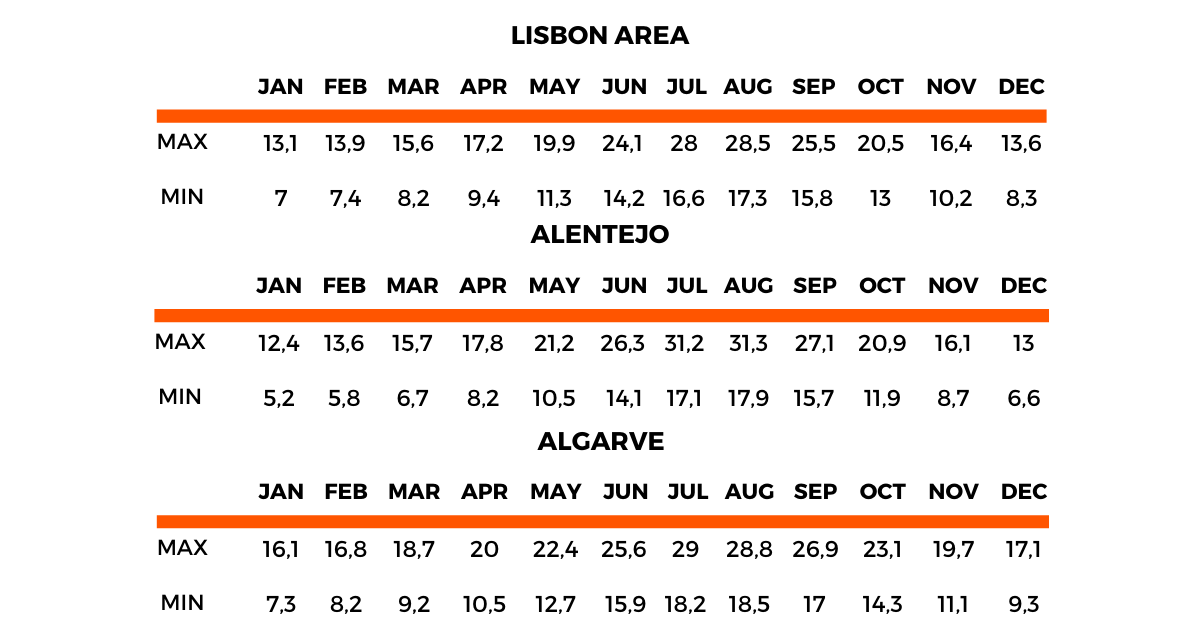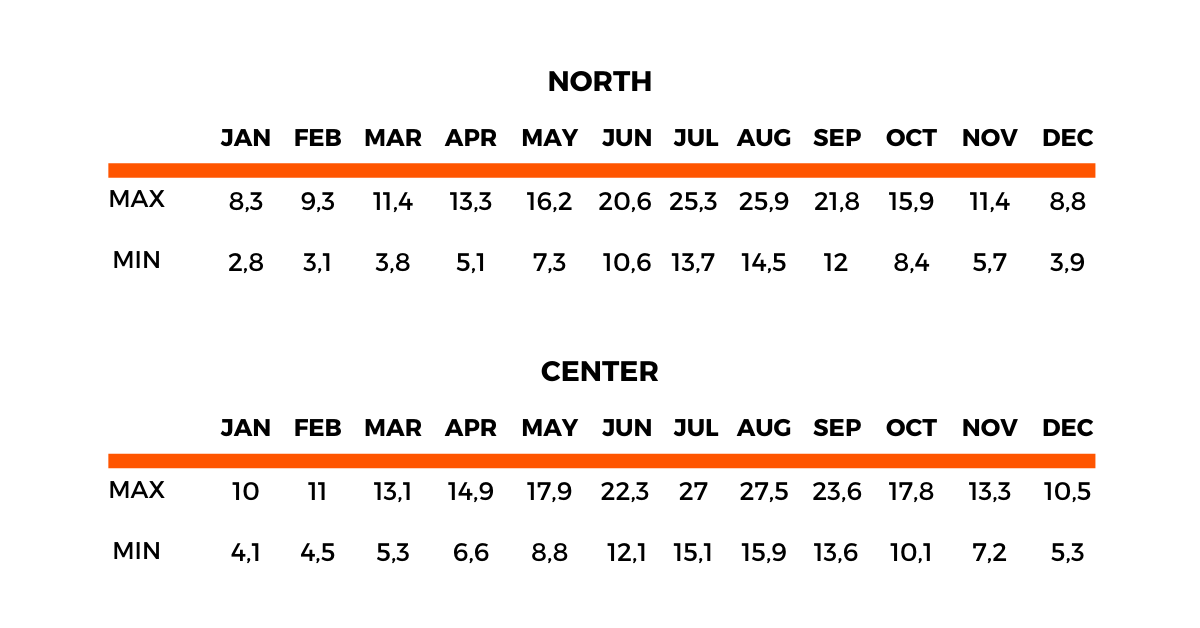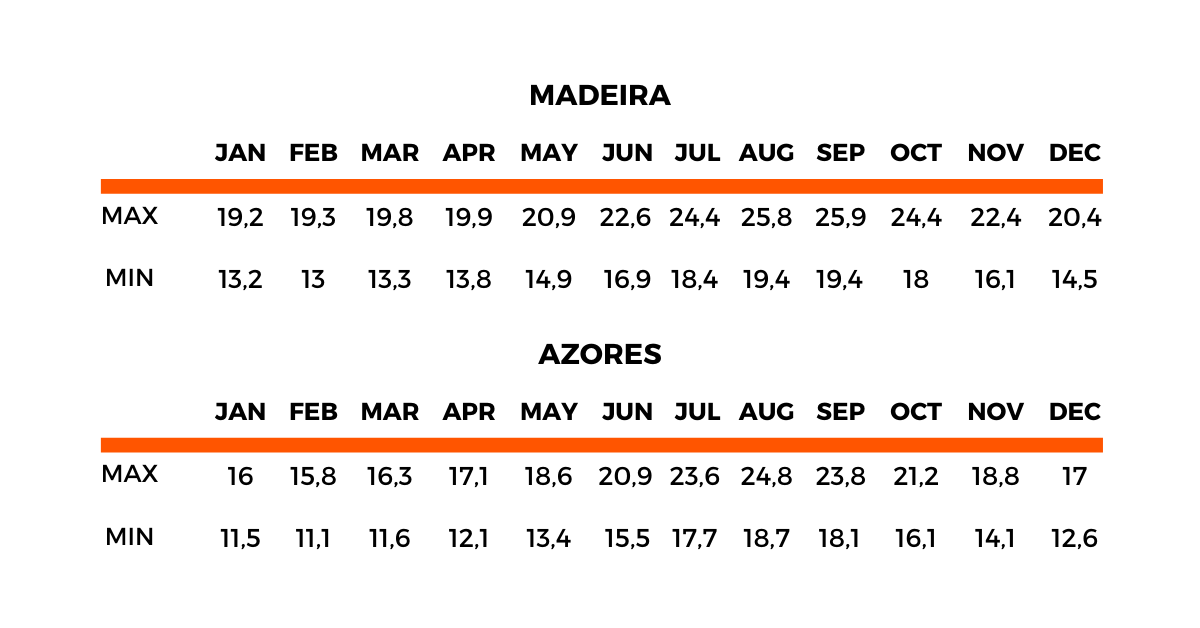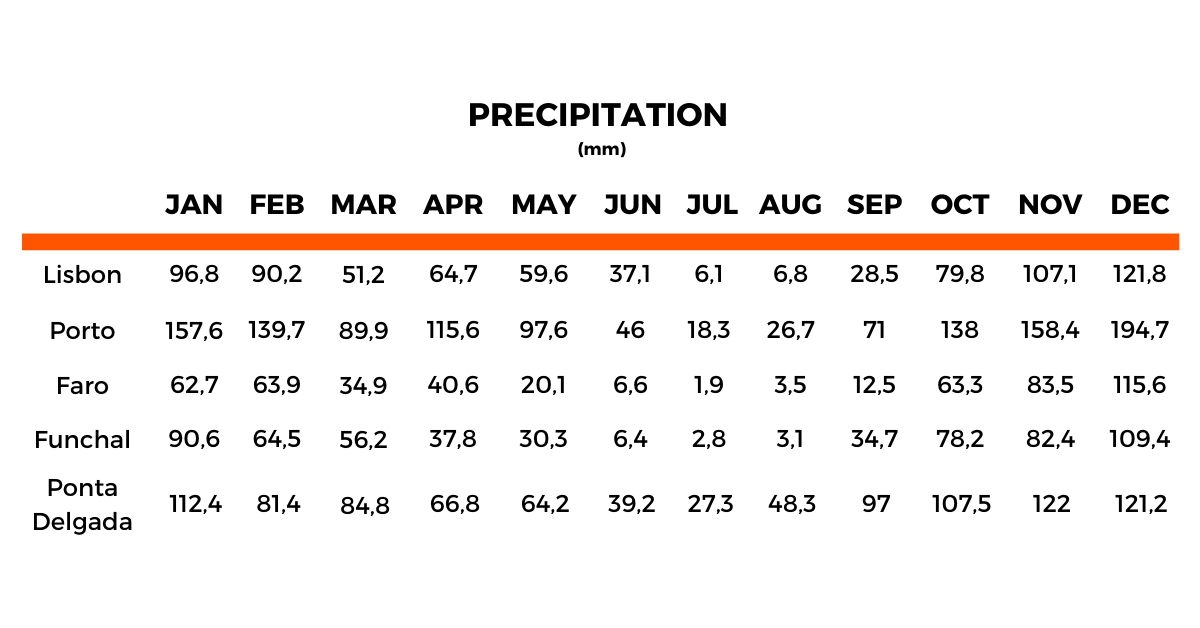Portugal Monthly Weather: best time to travel to Portugal

A House on the side of the Ocean
It is how many of us like to think of Portugal, a unique place in the world, and our hearts. Although us Portuguese have this special affection and hate relationship with our country, there is one thing that we all agree, passion and sheer: the sun! And this is the perfect country for us!
Besides being sunny and warm, there are some specific details on the Portugal monthly weather. Which may vary depending on the region as well. That’s why we’ve created a full guide on the Portuguese weather to help you decide when it’s the best time to travel to Portugal.
The European country with more sun hours per day/year
This factor is responsible for some of our country’s most incredible features; for example, our wine culture, agriculture, and cork production.
We are “blessed” as very rarely we have natural disasters relative to weather during the year, especially compared with other countries worldwide, which is mainly because of Portugal’s location and geographic layout.
However, we have isolated episodes of more aggressive weather since Portugal ends up being at the mercy of a large force of nature (the Atlantic Ocean) and a country (Spain) that, with its geographical layout, also affects Portugal’s weather.
From North to South, the western side faces the Atlantic Ocean, stable and wide enough to affect the weather throughout the country. However, in the South, the Atlantic Ocean mixes with the Mediterranean Sea. This mild down everything, creating the perfect conditions to make the South of Portugal the area with more favourable temperatures throughout the year.
Spain embraces the North and East side borders of Portugal. Looking at both countries, we have a large inland area with a temperature amplitude compared to a desert. Spain’s geographic layout allows colder winds from northern territories to get to Portugal due to the large flat valley area of Spain.
To sum up, Portugal is a small country, but because of all these factors, the weather can change so much and so quickly that it will make you feel like you passed to a different country.
This weather also has a deep-felt impact on our culture, gastronomy, and society.
In general, we can say that Portugal’s weather is Mediterranean type, with mild temperatures and sunny days. Still, when we try to be more specific, it gets complex as it varies a lot between regions.
Lisbon Weather & the South
The regions of Lisboa, Portalegre, Évora, Setúbal, Beja, and Faro can easily reach temperatures above 30ºC or above 45ºC during the Summer with rainy days in the Winter. The Atlantic comes into action and can indeed bring some tropical storms from the other side of the ocean. Still, overall, we enjoy long and pleasant summers where we start having warmer temperatures somewhere around May that extend until October in some years.
The Winter gets cooler temperatures around this southern region. Only around particular locations can the temperatures go under 0ºC. This region is much flatter than the North of Portugal and has fewer river courses and green vegetation. For this, it is normal that temperatures rise and change quickly.

Center & North Portugal Weather
From central Portugal to the North, in areas like Coimbra, Viana do Castelo, Braga, Vila Real, and Bragança, the weather changes as Portugal’s shape also changes.
In these northern territories, we have the highest mountains in mainland Portugal, being the highest Serra da Estrela (Star Mountain).
This combination of high grounds, mountains, and steep valleys make it a lot easier for colder and even negative temperatures to last longer. It is normal to snow throughout the Winter and to have much colder temperatures than in the South.
The same happens during the Summer, as northern Portugal has lower temperatures than southern regions, because of all those characteristics mentioned before.
This weather profoundly impacts daily life and gastronomy, as the North’s cuisine tends to be composed of “heavier” foods to compensate for the cold. The houses are also different, and it is more common to find central heating or fireplaces when accommodated in Portugal’s northern regions.

Azores & Madeira Year Round Weather
We have Azores and Madeira, two different sets of islands that share some similarities, outside mainland Portugal.
The Azores are located almost in the middle of the Atlantic Ocean, and Madeira is closer to the coast of northern Africa. Although separated by 880 km of water, the similarities in the weather are a lot.
Both places can have an average of 20ºC during the entire year, having a tropical atmosphere, allowing the existence of unique activities, like the production of tea, exotic fruits, and aromatic herbs as some examples.
Being this tropical, the location of both places leaves them exposed to many of those storms that cross the Atlantic Ocean towards Europe. When Winter storms lose a lot of their strength and power in their path towards the mainland, they cross over the islands, being the Azores hit by storms a lot more times due to its central location.
It is also the set of islands of the Azores and that specific location that helps create the natural phenomenon of Azores’ anticyclone. This event creates high atmospheric pressure over a vast ocean area, its winds working clockwise, and its strength incredibly influences the weather in northern Africa, Europe, and the Americas.

Local tips & how to get ready for Portugal’s weather year round
- For Portugal Winter months, consider packing a sweater, a warm jacket, and a raincoat
- For Portugal Summer & Spring, consider packing a light sweater and a windbreaker
- Cloudy days still carry UV rays, make good use of sunscreen even during fall months
- Consider wearing more than two layers of clothes in Winter
- Not all short term rentals have AC
- Central heating is not conventional in restaurants or bars
- Some restaurants and cafes have a place outside with heater for colder evenings

When is the best time to travel to Portugal?
Portugal is a country that has it for all tastes and ages. It can be a retreat from aggressive winters and with milder temperatures but still have some snow or rain.
Suppose you love to meltdown by the beach and get a suntan, then the calm Algarve is the perfect location. It has a famous nightlife scene because of the warm temperatures throughout the night. Follow towards North and explore hundreds of artificial beach areas, raised close to rivers, dams, lagoons, and other types of water, and still enjoy Portugal’s high summer temperatures. Finally, when in the Azores, enjoy the warm thermal waters and temperatures close to 20ºC during Winter.
In Summer, Portugal gets full of life as the Portuguese love the sun and the excellent weather. The country hosts events, from music festivals, cultural and religious celebrations, fairs from all sorts, from medieval to gastronomy. The days are long and warm while our Winters make us appreciate the pleasures of life as we turn more to food and family while we wait for the next Portuguese Summer.
Are you preparing your next trip to Portugal?
Save this article or download the images of the places you want to visit.